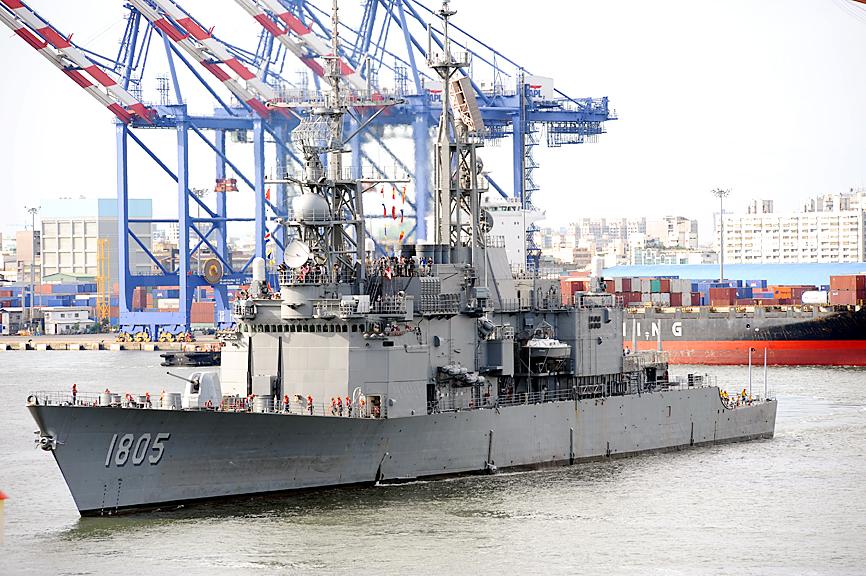China appears to have built mockups of a port in northeastern Taiwan and a military vessel docked there, with the aim of using them as targets to test its ballistic missiles, a retired naval officer said yesterday.
Lu Li-shih (呂禮詩), a former lieutenant commander in Taiwan’s navy, wrote on Facebook that satellite images appeared to show simulated targets in a desert in China’s Xinjiang region that resemble the Suao naval base in Yilan County and a Kidd-class destroyer that usually docks there.
Lu said he compared the mockup port to US naval bases in Yokosuka and Sasebo, Japan, and in Subic Bay in the Philippines, but it more closely resembles Suao.

Photo: Chang Chung-yi, Taipei Times
The South China Morning Post on Thursday quoted Lu as saying that the mockup vessel resembled one that was based in northeast Taiwan and some Guam-based US vessels.
“The mockups and drills suggest that Chinese People’s Liberation Army warships are simulating precision strikes on the Guam naval base and the Suao military port using China’s YJ-21 anti-ship missiles,” the newspaper quoted him as saying.
“A site with full-scale piers and a destroyer-sized ship-like target was constructed in December [last year],” said a report published on Wednesday on the US Naval Institute Web site, an independent forum.
“A test missile hit ... dead-center on the ship replica in February” at the Taklamakan Desert site and the target was quickly disassembled “and is now gone,” the Web site reported.
In November last year, satellite images showed that China was building targets that simulated a US aircraft carrier and other US warships in the desert to test its hypersonic anti-ship ballistic missiles, including YJ-21s, which are an increasingly significant threat to vessels, it said.
Images of the sites were in satellite images that the US Naval Institute posted, but it did not name any structures that the mockups might have been modeled after.

Taiwanese can file complaints with the Tourism Administration to report travel agencies if their activities caused termination of a person’s citizenship, Mainland Affairs Council Minister Chiu Chui-cheng (邱垂正) said yesterday, after a podcaster highlighted a case in which a person’s citizenship was canceled for receiving a single-use Chinese passport to enter Russia. The council is aware of incidents in which people who signed up through Chinese travel agencies for tours of Russia were told they could obtain Russian visas and fast-track border clearance, Chiu told reporters on the sidelines of an event in Taipei. However, the travel agencies actually applied

Japanese footwear brand Onitsuka Tiger today issued a public apology and said it has suspended an employee amid allegations that the staff member discriminated against a Vietnamese customer at its Taipei 101 store. Posting on the social media platform Threads yesterday, a user said that an employee at the store said that “those shoes are very expensive” when her friend, who is a migrant worker from Vietnam, asked for assistance. The employee then ignored her until she asked again, to which she replied: "We don't have a size 37." The post had amassed nearly 26,000 likes and 916 comments as of this

New measures aimed at making Taiwan more attractive to foreign professionals came into effect this month, the National Development Council said yesterday. Among the changes, international students at Taiwanese universities would be able to work in Taiwan without a work permit in the two years after they graduate, explainer materials provided by the council said. In addition, foreign nationals who graduated from one of the world’s top 200 universities within the past five years can also apply for a two-year open work permit. Previously, those graduates would have needed to apply for a work permit using point-based criteria or have a Taiwanese company

The Shilin District Prosecutors’ Office yesterday indicted two Taiwanese and issued a wanted notice for Pete Liu (劉作虎), founder of Shenzhen-based smartphone manufacturer OnePlus Technology Co (萬普拉斯科技), for allegedly contravening the Act Governing Relations Between the People of the Taiwan Area and the Mainland Area (臺灣地區與大陸地區人民關係條例) by poaching 70 engineers in Taiwan. Liu allegedly traveled to Taiwan at the end of 2014 and met with a Taiwanese man surnamed Lin (林) to discuss establishing a mobile software research and development (R&D) team in Taiwan, prosecutors said. Without approval from the government, Lin, following Liu’s instructions, recruited more than 70 software